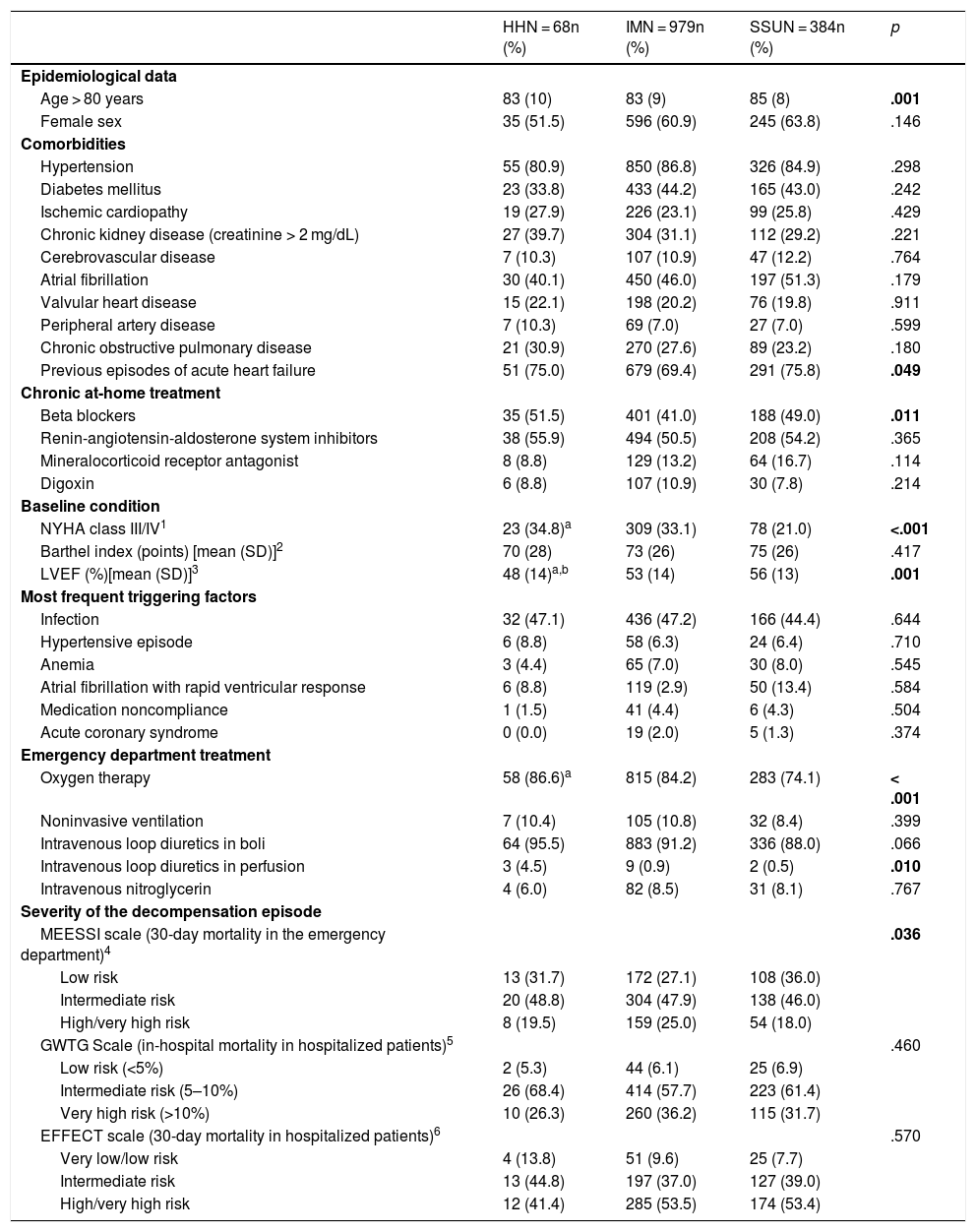To describe the frequency, clinical characteristics and outcomes of patients with acute heart failure (AHF) transferred directly from emergency departments to home hospitalisation (HH) and to compare them with those hospitalised in internal medicine (IM) or short-stay units (SSU).
MethodWe included patients with AHF transferred to HH by hospitals that considered this option during the Epidemiology of Acute Heart Failure in Spanish Emergency Departments (EAHFE) 4-5-6 Registries and compared them with patients admitted to IM or SSU in these centres. We compared the adjusted all-cause mortality at 1 year and adverse events 30 days after discharge.
ResultsThe study included 1473 patients (HH/IM/SSU:68/979/384). The HH rate was 4.7% (95% CI 3.8–6.0%). The patients in HH had few differences compared with those hospitalised in IM and SSUs. The HH mortality was 1.5%, and the HH median stay was 7.5 days (IQR, 4.5–12), similar to that of IM (median stay, 8 days; IQR, 5–13; p = .106) and longer than that of SSU (median stay, 4 days; IQR, 3–7; p < .001). The all-cause mortality at 1 year for HH did not differ from that of IM (HR, 0.91; 95% CI 0.73–1.14) or SSU (HR, 0.77; 95% CI 0.46–1.27); however, the emergency department readmission rate during the 30 days postdischarge was lower than that of IM (HR, 0.50; 95% CI 0.25–0.97) and SSU (HR, 0.37; 95% CI 0.19–0.74). There were no differences in the need for new hospitalisations or in the 30-day mortality rate.
ConclusionsDirect transfer from the emergency department to HH is infrequent despite being a safe option for a certain patient profile with AHF.
Describir frecuencia, características clínicas y evolución de los pacientes con insuficiencia cardíaca aguda (ICA) ingresados directamente desde urgencias en hospitalización a domicilio (HaD) así como compararlos con los ingresados en medicina interna (MI) o unidad de corta estancia (UCE).
MétodoSe incluyeron los pacientes con ICA ingresados en HaD por parte de los hospitales que contemplaban esta opción durante los Registros EAHFE 4-5-6 y se compararon con los casos que ingresaron en MI o UCE en estos centros. Se compararon la mortalidad por cualquier causa al año y los eventos adversos los 30 días tras alta de forma ajustada.
ResultadosSe incluyeron 1.473 pacientes (HaD/MI/UCE:68/979/384). La frecuencia de HaD fue de 4,7% (IC95% = 3,8%–6,0%). Los pacientes en HaD tuvieron escasas diferencias respecto a los ingresados en MI y UCE. Su mortalidad durante el ingreso fue de 1,5% y la duración de la estancia mediana fue de 7,5 días (RIC = 4,5–12), parecida a MI (mediana = 8; RIC = 5–13; p = 0,106) y superior a UCE (mediana = 4; RIC = 3–7; p < 0,001). La mortalidad por cualquier causa al año en HaD no difirió respecto a MI (HR = 0,91; IC95% = 0,73–1,14) o UCE (HR = 0,77; IC95% = 0,46–1,27), pero la reconsulta a urgencias durante los 30 días postalta fue menor respecto a MI (HR = 0,50; IC95% = 0,25–0,97) y a UCE (HR = 0,37; IC95% = 0,19–0,74). No hubo diferencias en la necesidad de nuevas hospitalizaciones o en la mortalidad a 30 días.
ConclusionesEl ingreso directo desde urgencias en HaD es poco frecuente a pesar de ser una opción segura en un determinado perfil de pacientes con ICA.
Article
Diríjase desde aquí a la web de la >>>FESEMI<<< e inicie sesión mediante el formulario que se encuentra en la barra superior, pulsando sobre el candado.

Una vez autentificado, en la misma web de FESEMI, en el menú superior, elija la opción deseada.

>>>FESEMI<<<









